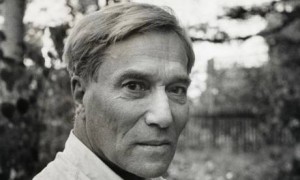A Translation of Boris Pasternak’s poem, ‘A Winter’s Night’

Feeling the need to take a break from translating prose, I decided to finally make an attempt to translate a Boris Pasternak poem that, while not seasonally appropriate in May, is one of my favorites—’A Winter’s Night’.
A Winter’s Night
The blizzard swept over all the land
Beyond the furthest road
A candle glowed near at hand
A candle glowed
As midges swarm in a cloud in summer
Around a flame
Snowflakes swirled from the yard together
To the window frame
On the glass the blizzard etched its brand
Circles, and arrows bowed
A candle glowed near at hand
A candle glowed
On the ceiling, candlelight glossed,
Shadows lay
Arms crossed, legs crossed
Fates at play
Two slippers fell with a light stamp
brushing the floor
Tears of wax dripped from the lamp
On the dress she wore
And all had vanished of the wild land
As the snow fog flowed
A candle glowed near at hand
A candle glowed
To the candle a draft from the corner blew
And the flame gave a toss
And two angelic wings it grew
In the shape of a cross
All February is the blizzard’s to command
And so it goes
A candle glows near at hand
A candle glowed
Boris Pasternak
Every time I read this poem I am reminded of scenes from David Lean’s 1965 film adaptation of Pasternak’s novel, ‘Doctor Zhivago.’ Translating ‘A Winter’s Night’ this time inspired me to view that film again, and I come away impressed by Lean’s efforts to use the imagery of some scenes to portray the world as seen through the eyes of a poet. The winter scenes in the Ural mountains make me feel that his direction is informed, to some degree, by his reading of at least this one of Pasternak’s poems.
As usual with poetry, I found this exercise in translation to be agonizing. I won’t go into the details of my suffering as I did in a previous post about translating Pushkin, but will just point to one especially difficult sacrifice: the original describes how the candle “burned”, and while the meanings are close, the emotional impact of “glowed” is much further from that of “burned.” That said, English words that rhyme with “glowed” are much more common, and useful in this case, than those that rhyme with “burned.”
© 2013, John Dougherty. All rights reserved

Thanks for posting your translation! This is one of the first poems that got me excited about Russian poetry – I remember pacing around a room reciting it when my Russian was finally just good enough to feel the meter.
One suggestion about the first line: Мело, мело по всей земле uses an impersonal past-tense form of the verb мести. Cf. the present-tense метёт, glossed here as ‘there’s a snowstorm.’ The translation makes it seem connected to мел ‘chalk,’ but I don’t personally hear a suggestion of that in the Russian.
Thanks to the author of XIX Век-Notes on Nineteenth Century Poetry and Prose for suggestions on improving this translation. I had a hard time trying to get a meaning of the verb мести-“to sweep”, “to dust” to work here, but this suggestion inspired me to dig deeper and find that the third person form of this verb can also mean “there is a blizzard.” So I’ve changed the first lines of the first and last stanzas accordingly.
This is also one of the first Russian poems I got excited about, and so committed memory.
Thanks again.
Hi John
It’s a very good translation! I am always astonished by people’s ability to translate poetry. Your blog makes a good reading, I like your skills and honesty in this hard quest of understanding Russia.
I want to recommend you one author, who is – in my opinion – the greatest of contemporary russian literators. Дмитрий Евгеньевич Галковский. His ‘hauptwerk’ – “Бесконечный Тупик” is not an easy to read, but it will help you greatly in understanding Russian psyche, soul and history.
By the way, the author turned 53 yesterday and accepting congratulations in his blog: http://galkovsky.livejournal.com/
Best regards, Alexey
Alexey, Thank you for your comment, and for your recommendation of Dmitry Evegyenevich Galkovsky’s work. I am always thankful for insights into the state of contemporary Russian literature. I have checked , and will take a look at his ‘Бесконечный Тупик,’ (which I might translate as ‘The Endless Stalemate’) soon.
Thanks again.
Someone published this translation on their blog, with some thoughts of what the poem brings to her. Reading them, I was reminded of the romantic nature of my regard for snow, which a big part of the reason I felt the need to translate this one of Pasternak’s many great poems.
Here is another translation of this same poem, submitted by PermLara (“Lara,” of course, is also the name of Zhivago’s love interest in Pasternak’s “Doctor Zhivago).
Thank you Lara!
Across the earth the blizzard was,
Snow sprawling wide.
The table, the candle, the swaying light.
The candlelight.
Alike in summer swarm of flies
To deadly flame
Aspired, rushed the flakes of snow
To window frame.
The blizzard sculptured on the glass
The signs of venus and the mars.
The table, the candle, the swaying light.
The candlelight.
Illuminated ceiling glossed.
The shadows crossed.
The overlap of arms and legs,
Of fate perplex.
Then sound of the falling shoes
To floor. Armchair,
Abandoned dress. Teardrops of wax
From candle there.
All lost in mist so gray and tight
And hoary white.
The table, the candle, the swaying light.
The candlelight.
The flame just swayed with the draft.
The ardent fire
Swung couple of wings in angel form
aglow higher.
The whole month the weather was
This endless white.
The table, the candle, the swaying light.
The candlelight.